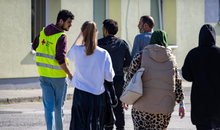
 Flash News
Flash News
4 cars collide in Fier, two people injured
He was carrying a weapon in his apartment! A person was arrested in Maliq
BIRN: Parliament resumes work, removing the floor from the opposition
Checks in Durrës prison, 10 cell phones seized, used by convicts
New Parliament/ 82 MPs who will be absent from September
Germany imposes restrictions on family reunification and tightens citizenship rules
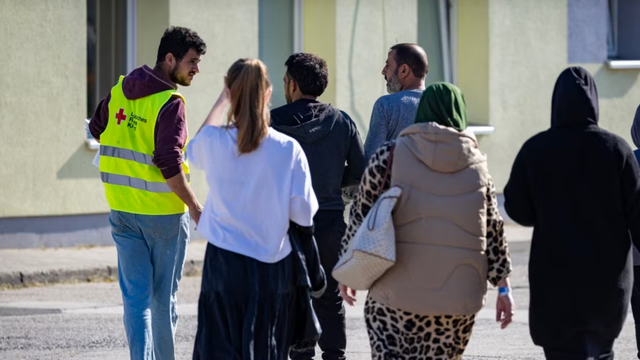
The German government on May 28 agreed to plans to impose restrictions on family reunification for some migrants and to tighten rules for obtaining citizenship.
Tightening migration policies was a key promise of the new conservative chancellor, Friedrich Merz, during the campaign for February's elections, and his government immediately imposed controls on Germany's borders after he took office as chancellor earlier this month.
Interior Minister Alexander Dobrindt told reporters on Wednesday that the new measures are important for reducing irregular migration.
The suspension of family reunification will last at least two years and will affect people who do not have full refugee status.
Dobrindt said that this decision will help "facilitate" the work of local councils, which are designated to provide assistance and integration to newcomers to this country.
He recalled that similar measures were in force between 2016 and 2018, at the time when Europe faced the migrant crisis.
Dobrindt also announced the abolition of a reform implemented by the previous government, under which immigrants could apply for citizenship after three years of residence in Germany if they could prove they had “successful integration.” The residency requirement will now be increased again to five years.
According to Minister Dobrindt, the new measures will help reduce "pull factors" for migrants who might otherwise try to enter Germany irregularly.
The far-right Alternative for Germany (AfD) party has long been against immigration, with leading party figures calling for mass deportations of foreigners.
Merz has been accused by critics of trying to win support from the AfD with his rhetoric, but he insists that taking action on migration is the only way to counter the rise in popularity of the far right.
The AfD achieved its best result ever, just over 20 percent, in the general election held in February.
Wednesday's decisions are expected to be approved by Parliament before the summer recess, which begins in July.
Tougher border controls, introduced earlier this month, aim to turn back all illegal migrants, including asylum seekers, and the measures have angered some of Germany's neighbors.
"It's no surprise that these decisions have sparked criticism," Dobrindt said.
"But they are necessary to clearly show that we have changed course on migration."/REL
Latest news





BIRN: Billions missing in economic growth
2025-05-29 22:14:22

Judge's brother bribed prosecutor, worked with gangs, and returned to work
2025-05-29 21:40:15
From Shijak to Lushnje, Berisha shows the armed gangs that helped the SP
2025-05-29 21:29:19


Berisha: Why did Rama hand over the Port of Durres to the Troplini cartel?
2025-05-29 21:08:01
Bylykbashi: This electoral system should have disappeared in 2020, it's not 2008
2025-05-29 20:47:04

KAS decides to open a box in a VC in Vlora
2025-05-29 20:36:19
Vokshi from the CDI Assembly: Europe must react to the electoral farce of May 11
2025-05-29 20:21:22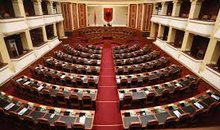


4 cars collide in Fier, two people injured
2025-05-29 19:10:12

Lawyer shocked: A sniper was paid by Albania to eliminate Prime Minister Kurti
2025-05-29 18:53:46



Netanyahu accepts US Gaza ceasefire plan, Hamas 'disappointed'
2025-05-29 17:53:48


He was carrying a weapon in his apartment! A person was arrested in Maliq
2025-05-29 16:59:51
Hamas receives new ceasefire proposal from US
2025-05-29 16:58:27


BIRN: Parliament resumes work, removing the floor from the opposition
2025-05-29 16:08:51
Movement in Tirana Police / Crime, road and urban traffic sectors affected
2025-05-29 16:03:00



Walnut leaves, learn how to use them for health
2025-05-29 15:26:05
Tirana/ 33-year-old man jumps from the third floor of the building
2025-05-29 15:08:38


Rama appeared alongside Brok, Berisha: Elmar's congratulations to him are ironic
2025-05-29 14:47:06
UN: Russia's drone attacks in Kherson, Ukraine, constitute war crimes
2025-05-29 14:37:56
Lek deposits decreasing for the second consecutive month
2025-05-29 14:34:19

Three people involved in drug trafficking are extradited to Italy
2025-05-29 14:08:06


What do we see when we die? The activity of the dying brain provides some clues.
2025-05-29 13:43:08
DP gathers political leaders at blue headquarters
2025-05-29 13:28:52

Checks in Durrës prison, 10 cell phones seized, used by convicts
2025-05-29 13:12:14
Banks worried about property prices
2025-05-29 12:58:06
Marriage on paper, Albanian and American woman accused by the US of fraud
2025-05-29 12:47:14

Socialist MP: I would gladly go to jail if a vote was bought
2025-05-29 12:30:58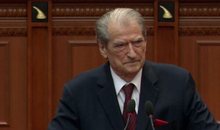

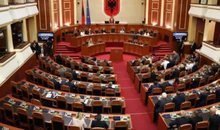
DP demands 60 minutes of debate in plenary session: Change the agenda
2025-05-29 12:07:53


New Parliament/ 82 MPs who will be absent from September
2025-05-29 11:26:35

DP demands repeat elections in Tirana district
2025-05-29 11:09:48



Investigations for Meta, lawyer: SPAK with political agenda
2025-05-29 10:30:41
Sentenced to 1 year in prison, Ervin Salianji requests parole
2025-05-29 10:24:35
SPAK strikes long-standing cigarette smuggling network with Customs' blessing
2025-05-29 10:08:47
Elon Musk leaves the Trump administration
2025-05-29 09:54:09
Accident in Kurbin/ Pedestrian dies after being hit by vehicle
2025-05-29 09:46:26

World Bank Report: 20% of Albanian population in poverty by 2025
2025-05-29 09:31:38
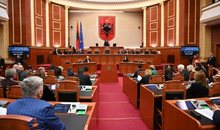


11 things people with high IQs do that they pretend to like, but actually hate
2025-05-29 08:47:46
TNT explosion inside the Fushe Kruja prison compound
2025-05-29 08:47:39
Horoscope, what do the stars have in store for you today?
2025-05-29 08:27:39
Fire in the bus park in Lushnja, four of them burned down
2025-05-29 08:12:48
Weather forecast, how temperatures will change during the day
2025-05-29 08:02:11
Morning Post/ In 2 lines: What mattered yesterday in Albania
2025-05-29 07:48:20

DP official: International reaction to the elections expected within two days
2025-05-28 22:43:54






Marco Rubio warns of massive visa freezes for foreign officials
2025-05-28 21:12:04

DP demands the repetition of the elections in the region of Fier
2025-05-28 20:52:44


Government, 5 million euros to build a luxury dog hotel
2025-05-28 20:01:58

Trump: Will know in two weeks whether to end Ukraine war after Putin call
2025-05-28 19:40:52

